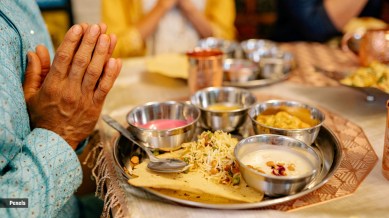📣 For more lifestyle news, click here to join our WhatsApp Channel and also follow us on Instagram
How to break a fast safely: Doctors and nutritionists share the best foods
From hydration to low-glycaemic foods, experts outline the safest and healthiest way to ease your body back after fasting.

Fasting is a common practice among fitness enthusiasts, diet-conscious individuals, and those observing religious or spiritual traditions. While some avoid food completely, others choose fruits, salads, or specially prepared fasting dishes. Whatever the method, experts stress that the way you break your fast is just as important as the fast itself. Jessie Inchauspé, a French biochemist and bestselling author, recently explained on a podcast that the first foods you eat after fasting go straight into the bloodstream — making food choices critical.
She warns against starting with sugars or starches, which can cause glucose spikes. Taking her cue, we asked nutrition and medical experts how to break a fast in a safe, balanced way.
What foods should you start with after a fast?
“Post-fast, the best foods are nutrient-rich, easy to digest, and won’t spike blood sugar,” says Ashlesha Joshi, senior consultant nutritionist at Tone 30 Pilates. She recommends starting with fluids like water, diluted lemon water, or bone broth to rehydrate.
This can be followed by fruits like berries or papaya for hydration and fibre, a boiled egg or Greek yoghurt for protein, soaked almonds or olive oil for healthy fats, and lightly steamed vegetables. Warm soups or broths are also soothing, especially after longer fasts. “This gives your pancreas time to regulate insulin secretion gradually, avoiding blood sugar spikes,” Joshi explains.
Why should sugary or starchy foods be avoided?
According to Joshi, “after a fast, your body is in a state of enhanced insulin sensitivity. A sudden intake of sugar or refined starch can cause a rapid blood glucose spike, followed by a sharp crash. This rollercoaster leaves you tired, irritable, and hungry again soon after eating.”
She cautions against white bread, pastries, or sweetened drinks, which can overstimulate insulin, promote fat storage, and upset metabolic balance. High-sugar foods also ferment quickly in the gut, often causing bloating and indigestion.
What happens if you eat too heavy after fasting?
Dr Palleti Siva Karthik Reddy, consultant, internal medicine at Koshys Hospital Bengaluru, explains: “After fasting, your digestive system is in a sort of rest mode. Enzymatic activity slows, gastric motility reduces, and the stomach shrinks slightly. Suddenly eating a heavy meal, rich in fats, carbs, and spices, is like flooring the accelerator on a cold engine.”
The immediate effects can include bloating, acid reflux, cramps, or nausea. In rare cases, especially after prolonged fasts, rapid refeeding may even trigger electrolyte and fluid imbalances — a condition known as refeeding syndrome.
Are there precautions for people with medical conditions?
Both Dr Reddy and Joshi stress that people with conditions like diabetes, hypertension, kidney disease, acid reflux, or cardiovascular issues should be extra cautious. “Breaking a fast needs strategy, not spontaneity,” says Dr Reddy.
For diabetics, he explains that starting with high-glycaemic carbs like fruit juices or sweets can trigger a glucose spike followed by a rapid drop, leading to fatigue, sweating, or even hypoglycaemia. “Because insulin sensitivity is higher post-fast, it’s vital to avoid such foods,” he adds.
Joshi recommends low-glycaemic, balanced options such as moong dal khichdi with ghee, a boiled egg with sautéed spinach, or unsweetened Greek yoghurt with chia seeds. “Start with plain water or coconut water, and avoid sugary drinks,” she suggests.
For those with GERD or gastric ulcers, heavy or spicy meals can worsen reflux. “Avoid caffeine, acidic fruits, and fried foods at the first post-fast meal,” advises Dr Reddy.
“Those with chronic kidney disease must also manage electrolyte intake carefully. Dates, bananas, and certain meats may need to be restricted, depending on kidney function,” he adds.
How can you manage blood sugar and energy levels when breaking a fast?
To prevent energy crashes, Dr Reddy advises avoiding refined carbs on an empty stomach. “High-glycaemic foods like white bread, sweets, or fruit juices cause a rapid glucose surge, followed by an insulin spike and an energy crash a couple of hours later,” he warns.
Instead, he recommends complex carbs like oats or lentils, lean protein, healthy fats, and fibre to slow glucose absorption. “Break your fast with a small mini-meal, then eat your main meal one to two hours later. This staggered approach helps the digestive system warm up and keeps energy levels steady,” he says.
DISCLAIMER: This article is based on information from the public domain and/or the experts we spoke to. Always consult your health practitioner before starting any routine.
📣 For more lifestyle news, click here to join our WhatsApp Channel and also follow us on Instagram